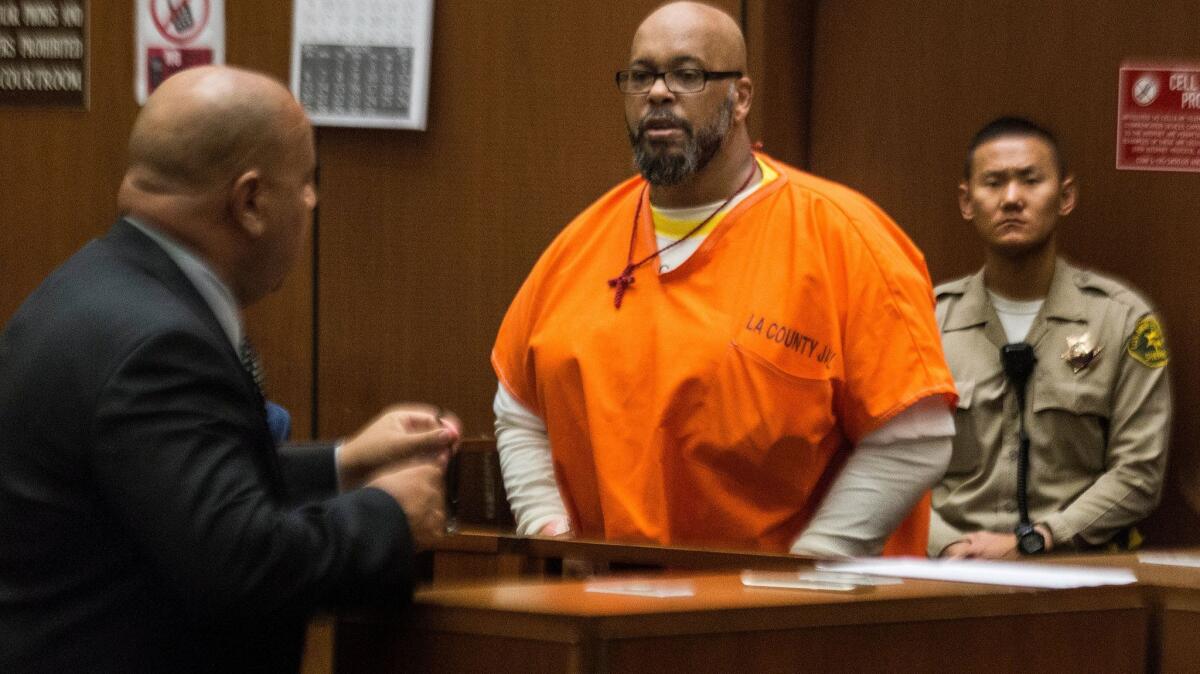Recordings suggest ‘Suge’ Knight discussed trying to bribe witnesses in his murder case, D.A. says

Transcripts of recorded conversations suggest former rap impresario Marion “Suge” Knight and his defense attorney discussed bribing witnesses to fabricate testimony in Knight’s upcoming murder trial, prosecutors alleged in court records made public Thursday.
According to the 22-page court filing by prosecutors, conversations between Knight, Long Beach attorney Matthew Fletcher and two others show the group understood “they were going to assist the defendant in procuring witnesses for his defense, which included payments for fabricated testimony.”
Knight, 52, is expected to stand trial next year on charges that he barreled his red truck into Terry Carter and Cle “Bone” Sloan in the parking lot of a Compton burger stand in late January 2015, following a dispute on the set of the movie “Straight Outta Compton.” Carter, 55, died of his injuries.
Footage from a security camera shows Knight — who has pleaded not guilty and says he acted in self-defense — plowing his truck into the men. Knight, who fled the scene but later turned himself in, also is accused of robbery and threatening the film’s director, F. Gary Gray, in separate cases.
Knight’s fiancee, Toi-Lin Kelly, and business partner, Mark Blankenship, also were on the phone calls, according to the Los Angeles County court filing. None of the people identified in the district attorney’s motion has been charged in connection with claims of witness tampering.
The district attorney’s motion also noted that on several occasions, Blankenship told Knight “that the witnesses being discussed would be procured by ‘legitimate’ means and that they would just ‘tell the truth.’ ”
The filing asked the court to conduct its own inquiry into whether Fletcher has a conflict of interest in representing Knight in the threat case, in part, because investigators have “gathered evidence of possible witness tampering, bribery, conspiracy to violate a court order and obstruction of justice on the part of attorney Fletcher.” The lawyer no longer is the attorney of record in the murder case. The evidence is likely to be raised by prosecutors during the murder trial, the filing said.
Fletcher denied wrongdoing, telling The Times that prosecutors had taken his words out of context and were trying to discredit defense witnesses before they testified. He said any talk of money was about attempts to obtain cellphone video to the hit-and-run recorded by witnesses.
“There’s cellphone videos that were out there. That’s what I was told. That’s what I sent people out to get,” he said.
Fletcher also expressed outrage that a judge authorized investigators to listen to his conversations with a client.
“If you can’t speak to your lawyer over the phone without the government listening to it, I find that fairly reprehensible,” he said.
In a text message to a Times reporter, Knight’s fiancee described the filing as “ridiculous and FALSE!!” saying neither she nor Knight spoke to witnesses, nor has anyone offered money in exchange for fabricated testimony. Kelly said prosecutors were attempting to destroy the integrity of defense witnesses who could validate Knight’s claims.
“ALL the facts and evidence of this case are on Mr. Knight’s side. There isn’t a single reason we would need to pay an individual for information,” she wrote. “We are anxious to be able to present the evidence our legal team has gathered.”
Blankenship sent a text to The Times, saying Knight is entitled “to defend himself and get justice by seeking truthful evidence that can be evaluated by a jury so that he can have a fair trial.”
In a series of recorded phone calls beginning in early 2015, prosecutors say that Knight, Fletcher, Kelly and Blankenship discussed paying witnesses to say they saw either the victims or others at the burger stand in possession of a gun, a move that would bolster Knight’s self-defense claim.
In one call, to an unidentified woman, Knight said he needed a witness to claim they saw guns on the day of the hit-and-run, according to the district attorney’s filing. Later that day, prosecutors said, Knight, Fletcher and Blankenship were involved in a conference call in which the possibility of exchanging cash for testimony was discussed.
“And you all went over there and you saw these guns removed from these two people,” Fletcher said, according to prosecutors. “Yes, yes. Fine, dude, you’re done. Here’s your money.”
While calls between Fletcher and Knight normally would have been protected by attorney-client privilege, a judge allowed investigators to listen to recordings if Knight called someone who then put Fletcher on the line, thus breaking the privilege.
In a March 13, 2015, phone call, prosecutors allege, Knight told his fiancee that there was a witness who would do whatever is needed and say they saw a gun.
“Witnesses are going to do what they are supposed to do,” Knight said, according to the transcript.
Prosecutors said they believe that Knight and Fletcher agreed “that witnesses would need to be paid in order for the defendant to obtain his freedom.”
Their defense, prosecutors contend, likely will hinge on the idea that the victims or others were armed on the day of the crime — a theory prosecutors say isn’t supported by the evidence.
In one March 2015 call, Kelly told Knight that Fletcher had “put some ‘bread’ out there to get witnesses to come around,” seemingly referring to cash, according to the filing. Kelly told The Times she was referring to the possibility of issuing a reward to encourage witnesses to come forward with truthful information.
In another March 2015 call, Fletcher referred to paying someone “$100 an hour each.” Prosecutors argue he was referring to witnesses.
The filing also lays out a plan orchestrated by Sheriff’s Department homicide investigators to place an informant near Knight on a transport bus in May 2016. After nearly 25 minutes on the bus, the informant — who prosecutors say was told not to question the defendant about his pending criminal matters — suggested he could be useful to Knight, according to the filing.
“I’m on my way home, blood. … Anything you need,” the informant said.
“You know, I’m going to find you,” Knight replied, then instructing the man to contact his former attorney, David Kenner, upon his release, according to the filing.
The next day, prosecutors say, the informant visited Fletcher’s Long Beach office, picked up his business card and exchanged texts with him. A couple of hours later, Fletcher called the informant, saying he and Knight “grew up together,” according to a transcript of the recorded May 2016 conversation included in the filing. At one point, Fletcher suggested gaining helpful testimony might cost money, according to the filing.
“These … got a price; let’s get that ... price paid,” Fletcher said, according to the transcript. “I told Suge, ‘You can always make some more money, you can’t make any more freedom though.’ ”
One week later, another attorney, Thaddeus Culpepper, contacted the informant, according to the filing. A transcript of their exchange was not included in the filing, but prosecutors said Culpepper agreed to pay the informant for “his sworn testimony that he was present at the time of the crime and [witnessed] evidence favorable to the defense,” according to the filing.
In a statement emailed to The Times Friday morning, Culpepper said he emphatically denies the prosecution’s claims and said Knight is eager to go to trial.
“The prosecution, on the other hand, is afraid and desperate. The facts in this case are extremely compelling and overwhelmingly prove Mr. Knight’s innocence,” he wrote. “No amount of prosecutorial spin or mudslinging will change that!”
The district attorney’s filing also accuses Fletcher of playing a role in the leak of a key piece of evidence — surveillance video of the red truck barreling into two men at the Compton burger joint. A judge had ordered that the video not be given to the media.
Fletcher said he never had possession of the tape and therefore couldn’t have leaked it.
On March 9, 2015 — the day, prosecutors say, Fletcher became Knight’s attorney of record in the murder case — the video was published by TMZ.
Sheriff’s detectives got a warrant to search Kelly’s cellphone, and prosecutors say they found messages between her and a TMZ correspondent in March 2015 negotiating a price for the video.
The filing by prosecutors said Kelly and Knight communicated in code about a plan to sell the video for as much as $150,000. In the end, the TMZ correspondent and Kelly agreed to “55,” though the filing doesn’t say whether that meant $55,000.
On March 9, 2015, six hours after the video went live on TMZ, prosecutors say Fletcher texted Kelly saying, “That went well.”
Follow us on Twitter: @JamesQueallyLAT and @marisagerber
ALSO
L.A. has been sued again over traffic lane reductions in Playa del Rey
Big rig crash near Grapevine starts brush fire and closes southbound 5 Freeway
UPDATES:
8:40 a.m. Aug. 11: This article was updated with a statement from Culpepper.
8:10 p.m.: This article was updated with additional details from the district attorney’s filing and comments from Fletcher, Kelly, Blankenship and Culpepper.
This article was originally published at 3:45 p.m. Aug. 10.
More to Read
Sign up for Essential California
The most important California stories and recommendations in your inbox every morning.
You may occasionally receive promotional content from the Los Angeles Times.












